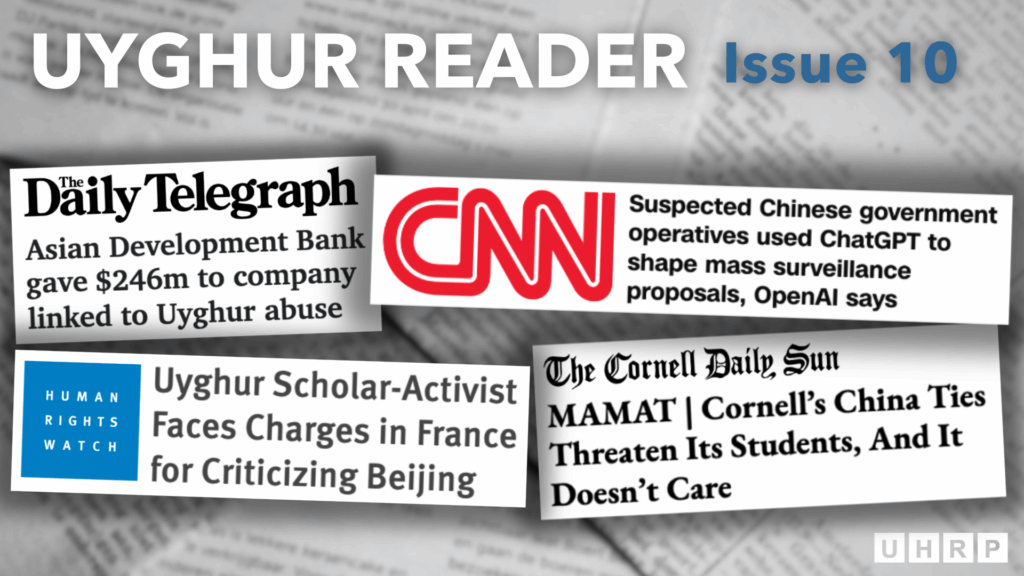The Uyghur Reader: Stories We’re Following (Issue 10)

Issue 10: October 2 – October 15, 2025
Welcome to the tenth issue of the Uyghur Reader, a biweekly content roundup curated by the staff of the Uyghur Human Rights Project.
Each issue features carefully selected articles, reports, and publications from media outlets, academic institutions, NGOs, and government sources. While we highlight urgent human rights issues, we also aim to reflect the breadth of the Uyghur experience, including politics, economics, history, and culture.
This week’s selections come from Associate Director for Research and Advocacy Peter Irwin and Director of Research Henryk Szadziewski.
📌 Reporting for The Daily Telegraph, Charles Chadwick reveals that the Asian Development Bank (ADB) awarded A$246 million in contracts to Chinese conglomerate TBEA, a company linked to Uyghur forced labor and cooperation with the sanctioned Xinjiang Production and Construction Corps (XPCC). The Albanese Government is now pressing the ADB to review its antislavery safeguards amid concerns that the bank’s partnerships with the Xinjiang government risk legitimizing Beijing’s repression. Rights experts argue that stronger due diligence and immediate enforcement, not delayed reforms, are needed to prevent complicity in state-imposed forced labor. “Asian Development Bank gave $246m to company linked to Uyghur abuse,” October 14.
📌 In a case that demonstrates China’s transnational repression of dissent in the diaspora, French‐Uyghur scholar Dr. Dilnur Reyhan is being prosecuted in France over her protest actions after employees of China’s Paris embassy lodged a complaint. Yalkun Uluyol and Bénédicte Jeannerod of Human Rights Watch write that this is a politically motivated attempt to silence her and others speaking out on the rights of Uyghurs. “Uyghur Scholar-Activist Faces Charges in France for Criticizing Beijing,” October 9. On October 13, Human Rights Watch reported Dr. Dilnur “was convicted of ‘damage to public property’ and fined €150, ordered to pay €1 in damages and interest, and to reimburse legal fees.”
📌 For Sourcing Journal, Jasmin Malik Chua assesses the Uyghur Forced Labor Prevention Act’s record since June 2022. While nearly 10,500 shipments linked to the Uyghur forced labor have been blocked, enforcement gaps persist. Drawing on a recent CSIS analysis by Laura Murphy and Charlotte Tate, Chua shows the UFLPA’s influence on global policy, but cautions that without stronger political will and deeper corporate due diligence, its impact will remain limited. For Uyghur advocates, the UFLPA is a vital, though incomplete, tool for accountability. “Three Years On, Does the UFLPA Still Make Sense?” October 9.
📌 Sean Lyngaas and Jim Sciutto report that suspected Chinese government operatives used ChatGPT to draft proposals for large-scale surveillance tools targeting Uyghurs and other “high-risk” groups. OpenAI’s new report reveals how state-linked actors are experimenting with generative AI to refine repression, from designing systems to monitor Uyghur travel and police records to creating propaganda for tools that scan social media for “extremist speech.” “Suspected Chinese government operatives used ChatGPT to shape mass surveillance proposals,” CNN, October 7. Read the original report.
📌 In its new white paper, Arran Hope writes, Beijing frames its policies in East Turkistan as a struggle against “nihilism” by recasting Chinese historical and cultural authority as an existential mission, then embraces “denialism” by rejecting evidence of forced labor and genocide while blaming foreign powers, and finally celebrates “annihilation” through overt cultural erasure aimed at dissolving the distinct identities of Uyghurs and other Turkic peoples. “Nihilism, Denialism, and Annihilation in New Xinjiang White Paper,” Jamestown Foundation (China Brief), October 5.
📌 Cornell student Zilala Mamat exposes how the university’s partnerships with Chinese institutions enable the same government responsible for the Uyghur genocide, leaving Uyghur students vulnerable to surveillance and intimidation. She ties the institution’s silence to a broader pattern of complicity: when universities prioritize prestige and access over human rights, they turn their backs on those most at risk. “Cornell’s China Ties Threaten Its Students, And It Doesn’t Care,” The Cornell Daily Sun, October 2.
📌 Uyghur Rights Monitor‘s new report exposes how China’s Xinjiang Aid program, presented as poverty relief and development, is a central instrument of repression. Xinjiang Aid mobilizes cadre deployment, forced labor transfers, surveillance, and ideological assimilation to dismantle Uyghur communities. Under the rhetoric of “employment assistance,” Beijing disperses Uyghurs into factories and away from their home region, embedding coercion in global supply chains while erasing cultural and social ties. “Weaponized ‘Development’: How Xinjiang Aid Drives Repression,” October 1.
Keep reading:
- Eliot Chen, The Wire China, October 12: Laura Murphy on Enforcing America’s Ban on Uyghur Forced Labor
- Lisa Movius, The Art Newspaper, October 10: Beijing exhibition exploring Xinjiang heritage accused of ‘slipping into cultural appropriation and misrepresentation’
- Kharon, October 6: The UFLPA’s Tricky New Priority: A Chemical That Seeps Into Laptops and Apparel and Disappears
- Geraldine McKelvie, The Guardian, October 4: Watchdog cleared ex-Tory minister to work for offshoot of firm linked to China surveillance
- Tahir Imin Uyghurian, Uyghur Times, September 30: Xi Jinping Intensifies Push to “Sinicize” Religion, Erase Non-Han Identities
- Philip Hensher, The Spectator: What has the reparations movement ever done for victims of modern slavery?
